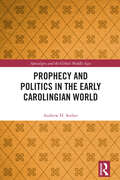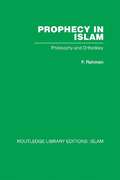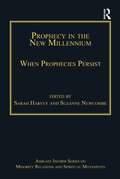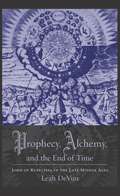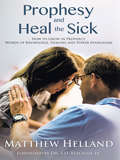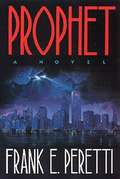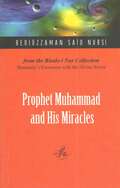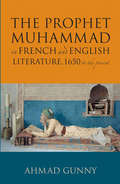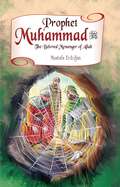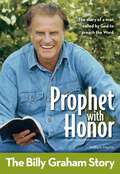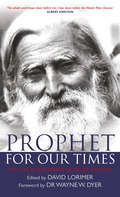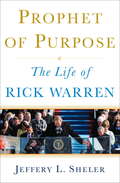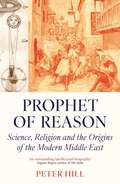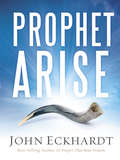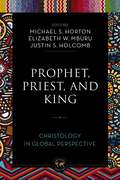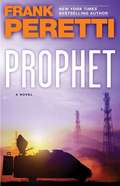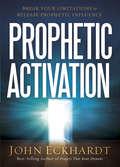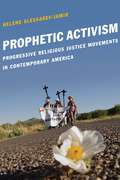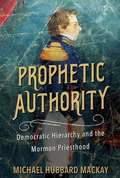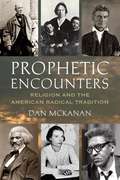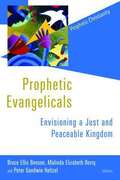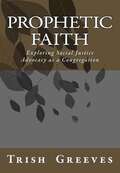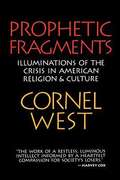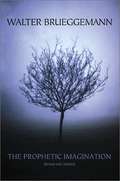- Table View
- List View
Prophecy and Politics in the Early Carolingian World (Apocalypse and the Global Middle Ages)
by Andrew SorberProphetic and apocalyptic rhetoric play critical roles in the development and articulation of political authority in the reigns of Charlemagne (d. 814) and Louis the Pious (d. 840). The rhetorical authority derived from claims of receiving revelation, interpreting divine communication, speaking for God, and foreseeing calamities became a competitive medium through which individuals legitimized political behaviour, debated their long- and short-term aspirations, and struggled for political supremacy. Ranging from claims of revelations, dreams, and visions, to the adoption of rhetorical voices based on biblical prophets, to the interpretation of signs and portents, prophetic rhetoric enjoyed extensive experimentation and varied application throughout early medieval political discourse.Prophecy and Politics in the Early Carolingian World argues that claims of divine revelation, resistant to any attempts to monopolize them, provided a powerful means of speaking with authority for all participants in Frankish political discourse. This authority proved instrumental in the articulation and dismantling of effective Carolingian royal authority from 768 to 840. The volume introduces and reinterprets early Carolingian political discourse and intellectual activity, as well as the centrality of apocalypticism in the Carolingian period, by emphasizing prophecy, or revelation and authority, rather than prediction and calamity.Early Carolingian political discourse was a dialogue that took place across royal proclamations, legal statements, historical texts, visions, scriptural commentaries, and manifestations of the natural world, and in this dialogue, the ability to interpret God’s will was as powerful as it was problematic.
Prophecy in Islam
by F RahmanOriginally published in 1958. This volume brings into focus an area of Islamic religio-philosophical thought to which relatively little attention has been paid by modern scholars of Muslim thought. The importance of the subject lies in the fact that it constitutes a central point at the confrontation of the traditional Islamic and Hellenic thought currents.
Prophecy in the New Millennium: When Prophecies Persist (Routledge Inform Series on Minority Religions and Spiritual Movements)
by Sarah Harvey Suzanne NewcombeSecular and spiritual prophets of doom abound in the information-rich twenty-first century - as they have for millennia. But there has yet to be worldwide floods, meteor impact, global computer failure, obvious alien contact, or direct intervention from God to end the world as we know it. Considering the frequency with which prophecy apparently fails, why do prophecies continue to be made, and what social functions do they serve? This volume gives a concise, but comprehensive, overview of the rich diversity of prophecy, its role in major world religions as well as in new religions and alternative spiritualties, its social dynamics and its impact on individuals’ lives. Academic analyses are complimented with contextualized primary source testimonies of those who live and have lived within a prophetic framework. The book argues that the key to understanding the more dramatic, apocalyptic and millenarian aspects of prophecy is in appreciating prophecy’s more mundane manifestations and its role in providing meaning and motivation in everyday life.
Prophecy without Contempt: Religious Discourse in the Public Square
by Cathleen KavenyThe culture wars have as much to do with rhetorical style as moral substance. Cathleen Kaveny focuses on a powerful stream of religious discourse in American political speech: the Biblical rhetoric of prophetic indictment. It can be strong medicine against threats to the body politic, she shows, but used injudiciously it does more harm than good.
Prophecy, Alchemy, and the End of Time: John of Rupescissa in the Late Middle Ages
by Leah DeVunIn the middle of the fourteenth century, the Franciscan friar John of Rupescissa sent a dramatic warning to his followers: the last days were coming; the apocalypse was near. Deemed insane by the Christian church, Rupescissa had spent more than a decade confined to prisons-in one case wrapped in chains and locked under a staircase-yet ill treatment could not silence the friar's apocalyptic message. Religious figures who preached the end times were hardly rare in the late Middle Ages, but Rupescissa's teachings were unique. He claimed that knowledge of the natural world, and alchemy in particular, could act as a defense against the plagues and wars of the last days. His melding of apocalyptic prophecy and quasi-scientific inquiry gave rise to a new genre of alchemical writing and a novel cosmology of heaven and earth. Most important, the friar's research represented a remarkable convergence between science and religion.In order to understand scientific knowledge today, Leah DeVun asks that we revisit Rupescissa's life and the critical events of his age-the Black Death, the Hundred Years' War, the Avignon Papacy-through his eyes. Rupescissa treated alchemy as medicine (his work was the conceptual forerunner of pharmacology) and represented the emerging technologies and views that sought to combat famine, plague, religious persecution, and war. The advances he pioneered, along with the exciting strides made by his contemporaries, shed critical light on later developments in medicine, pharmacology, and chemistry.
Prophesy and Heal the Sick: How to Grow in Prophecy, Words of Knowledge, Healing, and Power Evangelism.
by Matthew HellandYou Can Grow in Prophecy, Words of Knowledge, Healing, Power Evangelism and More! This book gives you the biblical foundation and practical steps to grow in these vital ministries. Subjects covered include: Raising up a New Generation of Prophets, The Three Prerequisites of Prophetic Ministry, How to Hear God’s Voice, How to Prophesy, Prophetic Activations, Prophetic Guidelines, Creating the Future, How to Grow in Words of Knowledge, How to Make God’s Love Tangible, How to Heal the Sick and How to Grow in Power Evangelism. “This comprehensive manual is the most practical and useful book I have read on the subject of ministering prophecy, healing and words of knowledge.” - Norman Wilke, SpiritLife Church, I.P.H.C. “This is a must-read book for living out the fullness of the Spirit in our generation.” - Dr. A.D. Beacham, Jr., Bishop I.P.H.C “I used to joke that my ministry was a non-prophet ministry. However, that all changed once I spent a couple of hours with Matthew Helland. If you want to discover how to tap into the power of prophecy, read this book!” - Daniel King, Evangelist
Prophet
by Frank E. PerettiBack Cover: "You will know the truth, and the truth will set you free." (JOHN 8:32) JOHN BARRETT, anchorman for "news-Six at Five," the city's most watched newscast, has a problem. His comfortable, successful world is being jarred to the breaking point. He's caught his producer skewing a story to fit her own prejudices, then lying to cover her tracks - and she appears to be hiding something much bigger. His father's "accidental" death suddenly isn't looking so accidental. Carl, his estranged son, has returned to challenge his integrity and probe to find the man behind the TV image. The supposedly professional and objective newsroom is now divided and fighting over Truth. And what are these mysterious "voices" Barrett is hearing ...? Once again, master storyteller Frank Peretti has woven a prophetic tale for our times. Prophet carries all the hallmarks of Frank's blockbusting fiction -plenty of edge-of-the-seat action, nail-biting suspense, breakneck pacing, and blow-you- out-of-the-water spiritual impact. But more than this, it penetrates to the very heart of a vast struggle that threatens to tear our society to pieces, the struggle over which vision of moral authority will define our nation.
Prophet Muhammad And His Miracles
by Bediuzzaman Said NursiProminent scholars of Islam say that the evidence of Prophet Muhammad&’s Prophethood and his miracles amounts to about 1000. Countless people have affirmed it in their own particular ways, and the Qur&’an itself provides thousands of such proofs. This book by Bediuzzaman Said Nursi talks about some of the extraordinary incidents that happened during the time of Prophet Muhammad, peace and blessings be upon him, in support of his Divine mission, that is, calling people to Islam. Bediuzzaman Said Nursi is one of the most influential scholars of Islam in modern Turkey.
Prophet Muhammad in French and English Literature
by Ahmad Gunny"Gunny, a pioneer in the study of French and European literary and theological representations of Islam in the modern period, offers a survey of over 350 years, which is both a cross cultural history and a discussion of the intellectual changes in the representation of the Prophet's life based on the examination of original published and unpublished manuscripts." -Islamic Horizons"Ahmad Gunny has been a pioneer in the study of French and European literary and theological representations of Islam in the modern period. Thanks to his acclaimed critical studies, students and scholars alike have found in his work new and important directions for research." -Nabil Matar, professor, University of MinnesotaThis magisterial survey of the Prophet Muhammad over three hundred and fifty years is both a cross cultural history and a discussion of the intellectual changes in the representation of the Prophet's life based on the close examination of original published and unpublished manuscripts.Ahmad Gunny is fellow and senior associate at the Oxford Centre for Islamic Studies.
Prophet Muhammad: The Beloved Messenger of Allah
by Mustafa ErdoganThis book is a short summary of Prophet Muhammad's life for the younger readers. It presents major milestones in the life of the Prophet with an easy to understand style in line with the mainstream Islamic tradition. It is also a great bedtime story book for interested families who want to read from the life of the Prophet.
Prophet With Honor, Kids Edition: The Billy Graham Story (ZonderKidz Biography)
by William C. MartinHis Message Would Be Heard Around The WorldNo one guessed he would change the world. A simple country farm boy once prayed that God would use him…and prayed…and prayed. And God did use him, beyond what he ever imagined. He grew into a man who would lead millions of people to Christ, a man who would be known as the greatest evangelist of our time. Come read the story of Billy Graham and follow his life from his days as a boy, who wasn’t so great in school, to a man who would teach the world the greatest lesson of all: how to know and live for Christ.
Prophet for Our Times: The Life & Teachings of Peter Deunov
by David LorimerPeter Deunov (Beinsa Dounov), who lived in Bulgaria from 1864 to 1944, was a great and inspired teacher of the Perennial Wisdom - the essential thread of truth running through all the major world religions. He was an extraordinary man who at once embodied great simplicity and tremendous profundity. All those who knew him testified to the fact that he inspired inner excellence in very ordinary people. His teachings are both direct and clear, and will speak to everybody whatever their creed. Essentially they give a prescription for living in harmony with others, with the Earth and with the Divine.Prophet for Our Times is being brought back into print following Dr. Wayne D. Dyer's desire to share the work of the philosopher who greatly influenced him. This selection of teachings makes ideal reading for anyone on the spiritual path. It explains simply and directly how to find love, wisdom, truth, justice, harmony, and balance in life. It also gives advice on techniques of prayer, meditation, and visualization, and valuable information on right diet and exercise to assist inner focus and clarity. Peter Deunov's wise words will speak to everyone, and will have special appeal to those searching for an authentic spiritual tradition of Western origin.
Prophet of Purpose: The Inside Story of Rick Warren and His Rise to Global Prominence
by Jeffrey L. ShelerRick Warren is arguably the most influential man in American religion today. Megachurch pastor, friend of world leaders, and trend-setting spiritual entrepreneur, he is widely recognized as the new public face of evangelical Christianity in America. No other modern churchman has matched his success as a leader and motivator of Christians. His book, The Purpose-Driven Life, is the bestselling nonfiction hardcover of all time, with more than 25 million copies sold. At a time when evangelicalism stands at a political and cultural crossroads, his stature continues to rise.But who is Rick Warren? What can be learned from the story of the man behind the message? And what does his life say about the state of Christianity today?Prophet of Purpose: The Life of Rick Warren traces the road Warren has traveled, the influences in his life, his trials and temptations, and the opposition he has encountered along the way. Honest, thorough, and insightful, it explores his spiritual coming of age during the turbulent 1960s, his principled determination to sit out the divisive battles between fundamentalists and moderates in the Southern Baptist Convention in the late 1970s, and his audacious endeavor in the 1980s to build a "church for people who hate church" in the suburbs of Los Angeles. From a handful of worshippers meeting in a tiny apartment, he grew a vibrant congregation of over 22,000 and a global network of pastors who follow his strategies for building churches and transforming lives. In this unofficial biography, Jeffery L. Sheler, who had unfettered access to Warren and those closest to him, presents an intimate portrait of Warren as a man of faith and vision but also of flesh and blood and human foibles-a pastor, communicator, philanthropist, and family man who is driven by a sense of divine purpose to complete the course his God has set before him.Prophet of Purpose brings Warren and his mission to life and provides a provocative glimpse into the potential future of Christianity in America.From the Hardcover edition.
Prophet of Reason: Science, Religion and the Origins of the Modern Middle East
by Peter Hill'An outstanding intellectual biography.' Eugene Rogan In 1813, high in the Lebanese mountains, a thirteen-year-old boy watches a solar eclipse. Will it foretell a war, a plague, the death of a prince? Mikha&’il Mishaqa&’s lifelong search for truth starts here. Soon he&’s reading Newtonian science and the radical ideas of Voltaire and Volney: he loses his religion, turning away from the Catholic Church. Thirty years later, as civil war rages in Syria, he finds a new faith – Evangelical Protestantism. His obstinate polemics scandalise his community. Then, in 1860, Mishaqa barely escapes death in the most notorious event in Damascus: a massacre of several thousand Christians. We are presented with a paradox: rational secularism and violent religious sectarianism grew up together. By tracing Mishaqa&’s life through this tumultuous era, when empires jostled for control, Peter Hill answers the question: What did people in the Middle East actually believe? It&’s a world where one man could be a Jew, an Orthodox Christian and a Sunni Muslim in turn, and a German missionary might walk naked in the streets of Valletta.
Prophet, Arise: Your Call to Boldly Speak the Word of the Lord
by John EckhardtSomething is stirring inside of you, but it has been silenced, gravely undermined, and misunderstood. You must believe that God has not forgotten you. He has not sidelined you. You are not crazy. Prophet, arise! Come out of your cave and be encouraged to speak forth the word of the Lord. God is calling you to be His Trumpet and to sound the alarm. The body of Christ desperately needs prophets to awaken and go forth. Whether you have never spoken a prophetic word or you actively engage your gift, best-selling author John Eckhardt provides an unparalleled, inspiring teaching for you. He boldly reveals the characteristics of a prophet that may lie dormant in your life so God can launch you into your calling. You will learn:Unique characteristics of a prophetThe details of a prophet&’s callWhat moves a prophet&’s heart and stirs the anointingThe rewards a prophet brings to those who receive themHow to find healing and deliverance for the prophet who has been hurtAnd much more!
Prophet, Priest, and King: Christology in Global Perspective (Theology Together)
by ZondervanHow might different voices from the global church help all Christians understand the person and work of Jesus Christ better? Written by a team of leading Majority World scholars, this joint project explores and articulates a doctrine of Christ by appealing to his threefold office as prophet, priest, and king. Thus, it considers Christology not only as a central tenet of the Christian faith but, by drawing from a variety of voices throughout the worldwide church, it also points to the unified testimony of the global, catholic church.This is the first volume in the Theology Together series, which highlights the voices of Majority World scholars, each of whom brings insights from a particular context, and places them in conversation with one another to contribute to a richer, deeper understanding of a shared faith in Christ.
Prophet: A Novel
by Frank PerettiNow in ebook, a classic from bestselling author Frank Peretti about a TV anchorman whose life is turned upside down as he starts hearing voices and discovers supernatural forces at play.John Barrett, popular anchorman, finds himself suddenly lost in the comfortable world he thought he understood.His producer seems to be hiding something big and lying to cover her tracks. His father’s “accidental” death isn’t looking quite so accidental. And his estranged son has returned search for the truth. On top of all this, John is starting to hear mysterious voices.Prophet has all the hallmarks of Peretti’s fast-paced blockbuster fiction, and his clear understanding of the vast spiritual struggle over moral authority marks every page.
Prophetic Activation: Break Your Limitation to Release Prophetic Influence
by John EckhardtOur God speaks! God is always challenging us to expand our spiritual growth. The prophetic must never become boring and routine, but it should always be exciting and new. The value of prophetic activations is that they will break limitations and give readers the ability to operate in different techniques in their spiritual walk. Prophetic Activation offers practical teaching from best-selling author John Eckhardt on how to activate the prophetic by guiding readers through steps such as:Reading a scripture and then releasing a prophetic Word to someoneReceiving just one word from God and then releasing a full prophecyPraying in the Spirit (tongues) and then releasing an interpretation
Prophetic Activism: Progressive Religious Justice Movements in Contemporary America (Religion and Social Transformation #2)
by Helene Slessarev-JamirWhile the links between conservative Christians and politics have been drawn strongly in recent years, coming to embody what many think of as religious activism, the profoundly religious nature of community organizing and other more left-leaning justice work has been largely overlooked. Prophetic Activism is the first broad comparative examination of progressive religious activism in the United States. Set up as a counter-narrative to religious conservatism, the book offers readers a deeper understanding of the richness and diversity of contemporary religious activism.Helene Slessarev-Jamir offers five case studies of major progressive religious justice movements that have their roots in liberative interpretations of Scripture: congregational community organizing; worker justice; immigrant rights work; peace-making and reconciliation; and global anti-poverty and debt relief. Drawing on intensive interviews with activists at all levels of this work—from pastors and congregational leaders to local organizers and the executive directors of the national networks—she uncovers the ways in which they construct an ethical framework for their work. In addition to looking at predominantly Christian organizations, the book also highlights the growth of progressive activism among Jews, Muslims, and Buddhists who are engaged in reinterpreting their religious texts to support new forms of activism. Religion and Social Transformation series
Prophetic Authority: Democratic Hierarchy and the Mormon Priesthood
by Michael MacKayThe Mormon tradition's emphasis on prophetic authority makes the Church of Jesus Christ of Latter-day Saints unique within America's religious culture. The religion that Joseph Smith created established a kingdom of God in a land distrustful of monarchy while positioning Smith as Christ's voice on earth, with the power to form cities, establish economies, and arrange governments. Michael Hubbard MacKay traces the Church of Jesus Christ of Latter-day Saints' claim to religious authority and sets it within the context of its times. Delving into the evolution of the concept of prophetic authority, MacKay shows how the Church emerged as a hierarchical democracy with power diffused among leaders Smith chose. At the same time, Smith's settled place atop the hierarchy granted him an authority that spared early Mormonism the internal conflict that doomed other religious movements. Though Smith faced challenges from other leaders, the nascent Church repeatedly turned to him to decide civic plans and define the order of both the cosmos and the priesthood.
Prophetic Encounters: Religion and the American Radical Tradition
by Dan MckananThough in recent years the religious right has been a powerful political force, making "religion" and "conservatism" synonymous in the minds of many, the United States has always had an active, vibrant, and influential religious Left. In every period of our history, people of faith have envisioned a society of peace and justice, and their tireless efforts have made an indelible mark on our nation's history. In Prophetic Encounters, Dan McKanan challenges simple distinctions between "religious" and "secular" activism, showing that religious beliefs and practices have been integral to every movement promoting liberty, equality, and solidarity. From Frederick Douglass, John Brown, and Elizabeth Cady Stanton in the nineteenth century to Dorothy Day, Martin Luther King Jr., and Starhawk in the twentieth, American radicals have maintained a deep faith in the human capacity to transform the world. This radical faith has always been intertwined with the religious practices of Christians and Jews, pagans and Buddhists, orthodox believers and humanist heretics. Their vision and energies powered the social movements that have defined America's progress: the abolition of slavery, feminism, the New Deal, civil rights, and others. In this groundbreaking, definitive work, McKanan treats the histories of religion and the Left as a single history, showing that American radicalism is a continuous tradition rather than a collection of disparate movements. Emphasizing the power of encounter--encounters between whites and former slaves, between the middle classes and the immigrant masses, and among activists themselves--McKanan shows that the coming together of people of different perspectives and beliefs has been transformative for centuries, uniting those whose faith is a source of activist commitment with those whose activism is a source of faith. Offering a history of the diverse religious dimensions of radical movements from the American Revolution to the present day, Prophetic Encounters invites contemporary activists to stand proudly in a tradition of prophetic power.
Prophetic Evangelicals: Envisioning a Just and Peaceable Kingdom (Prophetic Christianity Series)
by Bruce Ellis Benson Peter Goodwin Heltzel Malinda Elizabeth BerryIn this inaugural Prophetic Christianity volume, fifteen contributors share their visions for a biblically centered, culturally engaged, and historically infused evangelicalism. Interacting with a wide variety of influential thinkers, they articulate several approaches to creating a socially responsible, gospel-centric, and ecumenical evangelical identity.
Prophetic Faith: Exploring Social Justice Advocacy As A Congregation
by Trish GreevesThis highly praised, seven-session study explores the relationship between Christian faith, social justice, and the public role of the church. It invites individuals and congregations to explore how and why to respond to the biblical call for social justice in ways that are faithful to our vocation as followers of Jesus Christ and yet respect the pluralistic democracy in which we live and the separation of church and state mandated by the U.S. Constitution. Topics addressed in this accessible Participant Book include the political implications of biblical faith; public and private arenas for expressing faith; individual and communal forms of religious practices; the difference between systemic change (justice) and social outreach (charity); the impact of social location and false certainties on our perspectives; resistance to addressing controversial issues in church; civil religion as the unexamined conflation of God and country; how social justice advocacy strengthens the roots and fruits of our faith; what the separation of church and state means and doesn’t mean; and how to overcome paralysis when facing the complexity of social issues. Personal reflection questions throughout the book prepare the reader for group discussions.
Prophetic Fragments: Illuminations of the Crisis in American Religion and Culture
by Cornel WestThe articles include political commentary, cultural critique, literary analysis, extended book reviews, and even a short story by West. All of these are held together by a prophetic Afro-American Christian perspective.
Prophetic Imagination
by Walter BrueggemannIn this challenging and enlightening treatment, Brueggemann traces the lines from the radical vision of Moses to the solidification of royal power in Solomon to the prophetic critique of that power with a new vision of freedom in the prophets. Here he traces the broad sweep from Exodus to Kings to Jeremiah to Jesus. He highlights that the prophetic vision not only embraces the pain of the people but creates an energy and amazement based on the new thing that God is doing.
